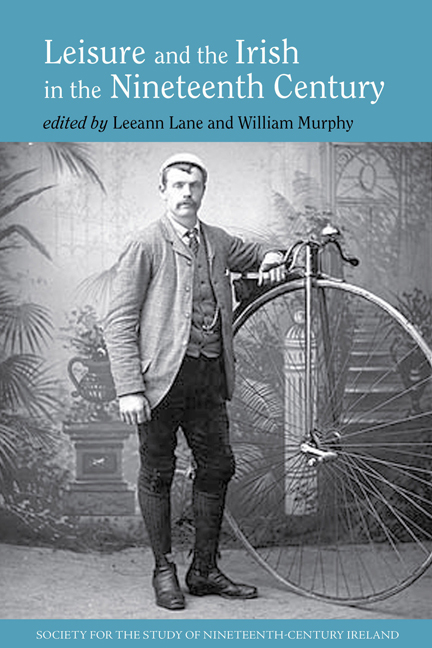Book contents
- Frontmatter
- Contents
- List of Figures and Tables
- Introduction
- Leisure and Associational Culture
- Leisure Spaces
- Leisure in Literature
- 6 Leisure in Charles Lever's Jack Hinton (1842) and the Continuities of Irish Fiction
- 7 The Fighting Irish: Faction Fighting as Leisure in the Writings of William Carleton
- 8 The Humours of Provincial Life: Theatre and Tourism in Matthew Archdeacon's Everard
- Leisure, Tourism and Travel
- Leisure and Female Élites
- Notes on Contributors
- Index
6 - Leisure in Charles Lever's Jack Hinton (1842) and the Continuities of Irish Fiction
from Leisure in Literature
- Frontmatter
- Contents
- List of Figures and Tables
- Introduction
- Leisure and Associational Culture
- Leisure Spaces
- Leisure in Literature
- 6 Leisure in Charles Lever's Jack Hinton (1842) and the Continuities of Irish Fiction
- 7 The Fighting Irish: Faction Fighting as Leisure in the Writings of William Carleton
- 8 The Humours of Provincial Life: Theatre and Tourism in Matthew Archdeacon's Everard
- Leisure, Tourism and Travel
- Leisure and Female Élites
- Notes on Contributors
- Index
Summary
No assessment of leisure in nineteenth-century Ireland would seem to be complete without some attention to the Irish Victorian writer, Charles Lever (1806–72). His early novels are full of people with a lot of time on their hands for leisure activities and are associated with a notion of excessive exuberance in the pursuit of leisure known as ‘rollicking’. As a result, they have been much criticised, though mostly inaccurately, for the promotion of demeaning humorous stereotypes of the Irish, particularly the Irish peasantry.
Lever was an Irish Protestant doctor who spent some time in rural Ireland and knew the conditions of poor people at first hand, having worked through the cholera epidemic of 1832. But he moved into the literary world and became the editor of the Dublin University Magazine in 1841. He also began to publish novels of Irish life to great popular acclaim in Britain, his most famous being his first, Harry Lorrequer (1837). For a time, the popularity of his work matched that of his contemporary Charles Dickens. But he came in for attack from a variety of fellow authors, possibly out of envy, though on other presenting grounds. Most damaging were the attacks from William Carleton who had a reputation for being the faithful and authentic chronicler of Irish peasant life in his own novels. Carleton accused Lever of presenting a demeaning, humorous version of Irishness for British consumption. Lever eventually moved to the continent, where he lived for the rest of his life, still writing novels.
This chapter focuses on Jack Hinton, the guardsman (1842), a novel mostly taken up with the description of leisure activities and whose main thematic interest lies in probing whether sincere feeling can be expressed through the social interaction that leisure gives rise to. Hinton is sent to Dublin to the staff of the Lord Lieutenant, the nominal ruler of Ireland, to get him away from the London social whirl. In Ireland he does not have much if any work to do and his time is taken up with leisure pursuits and socialising. Later on, he experiences the latter stages of the Peninsula War and becomes a prisoner of war of the French. He overcomes various obstacles and ends the novel married to Louisa Bellew whom he had met in Ireland.
- Type
- Chapter
- Information
- Leisure and the Irish in the Nineteenth Century , pp. 119 - 129Publisher: Liverpool University PressPrint publication year: 2016



